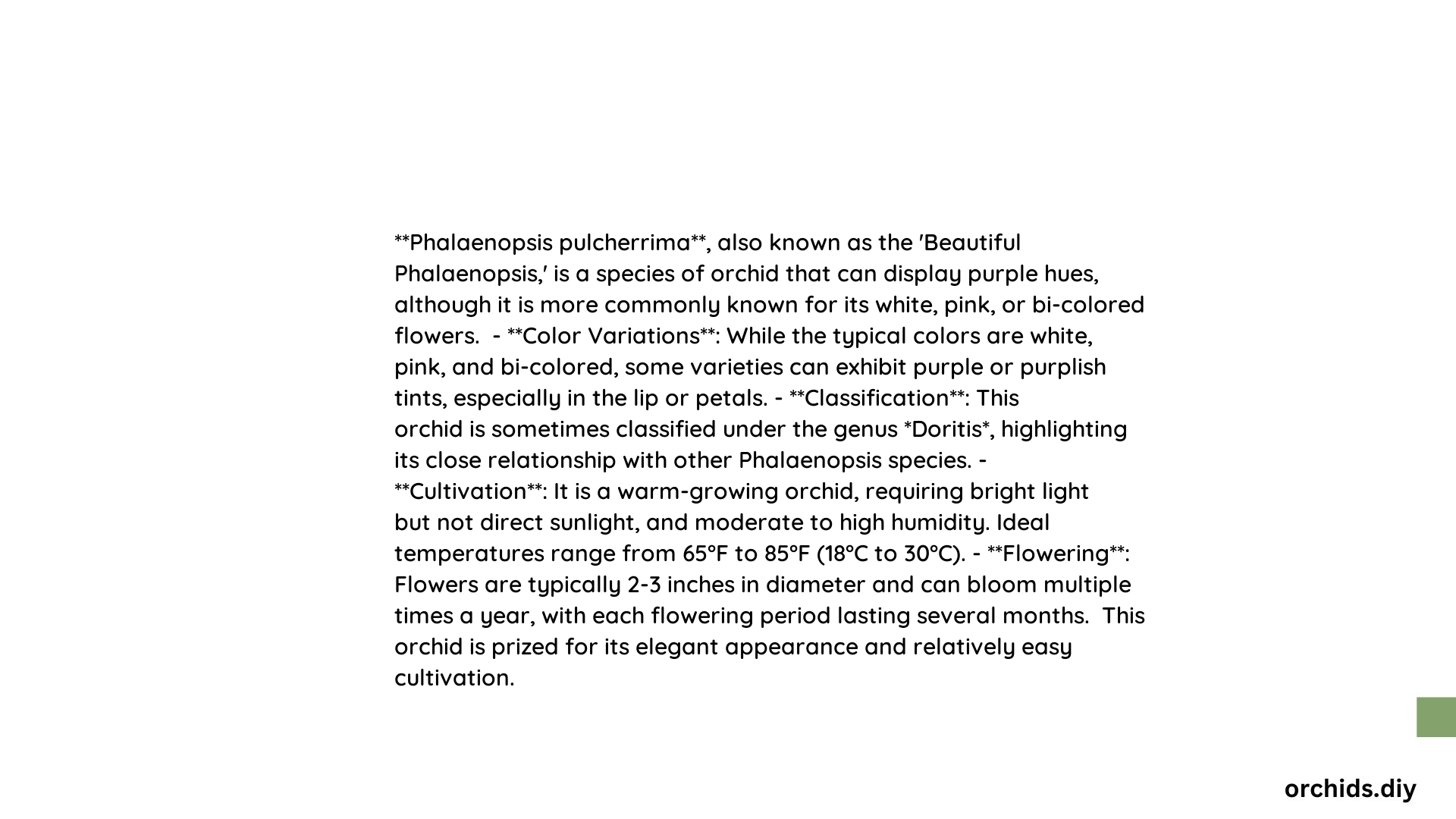Phalaenopsis pulcherrima purple is a stunning orchid variety known for its vibrant purple flowers and long-lasting blooms. This species, also known as Doritis pulcherrima, features erect inflorescences up to 100 cm long, bearing 10-20 showy flowers. With persistent, fleshy leaves and a three-lobed lip, this orchid is a popular choice among enthusiasts and collectors. Its unique characteristics and care requirements make it a fascinating subject for orchid lovers.
What Are the Key Characteristics of Phalaenopsis Pulcherrima Purple?
Phalaenopsis pulcherrima purple boasts several distinctive features that set it apart from other orchid varieties:
- Inflorescence:
- Length: Up to 40 inches (100 cm)
- Flower count: 10-20 blooms
-
Blooming pattern: Successive opening over an extended period
-
Leaves:
- Texture: Fleshy or leathery
- Color: Green or mottled
- Shape: Broad and flat
-
Orientation: Drooping
-
Flowers:
- Appearance: Showy and long-lasting
- Sepals and petals: Similar in shape and spreading
- Lip: Three-lobed with variable features
-
Unique trait: Often features antenna-like appendages
-
Genetic Classification:
- Genus: Phalaenopsis
- Family: Orchidaceae
- Order: Asparagales
- Synonym: Doritis pulcherrima
How Should You Care for Phalaenopsis Pulcherrima Purple?

Proper care is essential for the health and blooming of Phalaenopsis pulcherrima purple. Here’s a detailed guide:
Watering Techniques
- Frequency: Every 7-9 days, depending on environmental conditions
- Amount: Approximately 0.5 cups for a 5″ pot in indirect light
- Water quality: Reverse osmosis water recommended to prevent mineral buildup
- Misting: Regular misting helps maintain humidity, but allow time for drying between waterings
Potting Mediums
- Sphagnum Moss:
- Retains moisture well
- Allows good air circulation
-
Ideal for potted plants
-
Fir Bark:
- Improves drainage and aeration
- Can be mixed with other media for optimal results
Fertilization Regimens
| Aspect | Recommendation |
|---|---|
| NPK Ratio | 20-20-20 (balanced) |
| Dilution | Half the recommended strength |
| Application | Regular intervals during growing season |
| Alternative | Slow-release fertilizers (follow manufacturer’s instructions) |
What Are the Unique Features of Phalaenopsis Pulcherrima Var. Coerulea and F Coerulea Splash?
Phalaenopsis pulcherrima has several interesting varieties and forms, including:
Phalaenopsis Pulcherrima Var. Coerulea
- Color: Blue or blue-purple flowers
- Synonym: Doritis pulcherrima var. coerulea
- Available sizes:
- Blooming-size (2″ pot)
- Mature, multi-growth (4″ pot)
Phalaenopsis Pulcherrima F Coerulea Splash
- Color pattern: Splash or mottling of blue or blue-purple on a different background (often white or light purple)
- Unique trait: Intricate and varied color scheme
- Distinction: More complex coloration compared to the standard purple variety
When Is the Blooming Season for Phalaenopsis Pulcherrima Purple?
Understanding the blooming patterns of Phalaenopsis pulcherrima purple is crucial for optimal care and enjoyment:
- Primary blooming period:
- Late summer through winter into spring
-
Peak: Winter and spring
-
Hybrid variations:
-
Can bloom at various times throughout the year
-
Dormancy:
- No strict dormancy period
-
May experience reduced growth during hot summer months
-
Blooming triggers:
- Cooler day and night temperatures
- Inhibiting factors: Day temperatures above 82°F (28°C) and night temperatures above 77°F (25°C)
Tips to Extend Flowering Duration
- Provide bright, indirect light
- Maintain moderate humidity with good air circulation
- Water carefully, allowing slight drying between waterings
- Fertilize regularly without over-fertilizing
- Repot annually or when the plant doubles in size
By following these guidelines, orchid enthusiasts can successfully grow and enjoy the beautiful Phalaenopsis pulcherrima purple, appreciating its unique characteristics and stunning blooms throughout the year.
References:
1. [Phalaenopsis pulcherrima | Smithsonian Gardens – Plant Explorer]
2. [Phalaenopsis pulcherrima var. coerulea – Palmer Orchids]
3. [Doritis pulcherrima: How Much Water & Light Does it Need to Thrive?]
